#Edward W. Said
Text
it actually makes me sick to see the NFL, 49ers, and chiefs all make statements supporting Israel and calling palestinians terrorists. YOU'RE SUPPORTING THE TERRORISTS! what israel is doing is GENOCIDE. you're supporting GENOCIDE. who started the war? ISRAEL. who has a huge army? ISRAEL. who has continuously broken ceasefire? ISREAL. who is killing thousands of innocent people a day? ISRAEL. guess who doesn't have an official army and is basically defenseless? PALESTINE.
i wanted to say this again in light of recent events: i highly highly highly encourage anyone who sees this to read Edward W. Said's book After the Last Sky: Palestinian Lives (available on internet archive for free, but i recommend buying it). Said is palestinian, and in the book he talks about his childhood in palestine and the effects of being exiled from his homeland. the book is a true eye opener, and everything that Said says is still relevant today. it also includes photos, which truly emphasize the trauma and horrors the palestinian people have faced.
#free west bank#free palestine#free gaza#gaza#palestine#israel#save palestine#stop israel#human rights#current events#west bank#jerusalem#edward w. said#After the Last Sky: Palestinian Lives#i stand with palestine#i stand with gaza#rafah#dreams
5K notes
·
View notes
Text
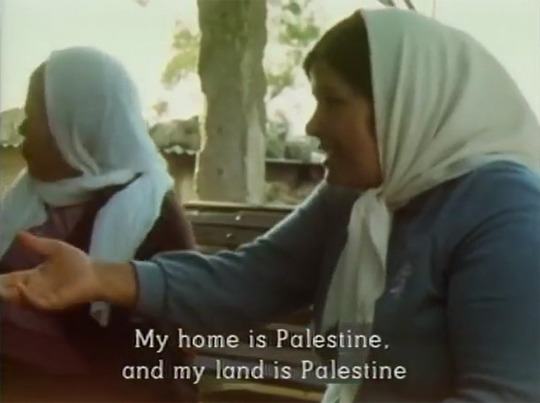
The Shadow of the West, (1986, documentary, TV series, 53min), (still, vimeo), Directed by Geoff Dunlop, Written and Narrated by Edward W. Said [The Eqbal Ahmad Project. Palestine Film Index]
#documentary#film#tv series#edward w. said#edward said#geoff dunlop#the eqbal ahmad project#palestine film index#1980s
699 notes
·
View notes
Text
– Read About Palestine –

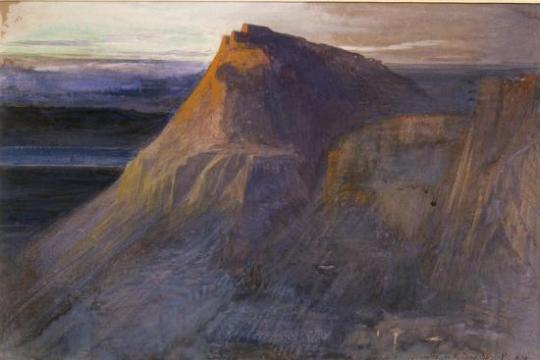
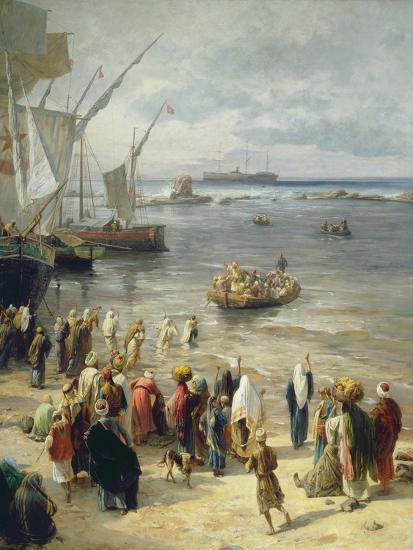


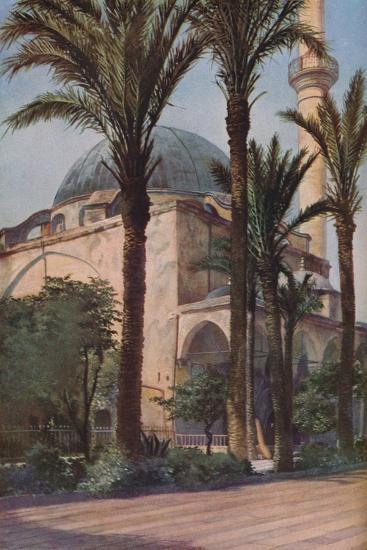
⚡️Fateful Triangle: The United States, Israel, and the Palestinians by Noam Chomsky
⚡️On Palestine By Noam Chomsky, Ilan Pappe and Frank Barat
⚡️The Ethnic Cleansing of Palestine by Ilan Pappe
⚡️The Hundred Years' War on Palestine by Rashid Khalidi
⚡️The Way to the Spring Life and Death in Palestine by Ben Ehrenreich
⚡️The Question of Palestine by Edward Said
⚡️Except for Palestine The Limits of Progressive Politics by Marc Lamont Hill, Mitchell Plitnick
⚡️Palestine A Four Thousand Year History by Nur Masalha
⚡️Where the Line Is Drawn by Raja Shehadeh
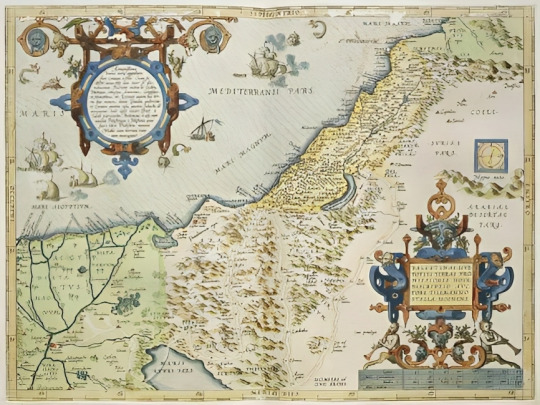
Israeli-Palestinian Discourse // Quotes
Artworks: Palestine', c1930s by Donald Mcleish // Masada on the Dead Sea, Palestine, 1859 by Edward Lear // Jaffa, Recruiting of Turkish Soldiers in Palestine, 1888 by Gustave Bauernfeind // Gourds Grown as a Vine in an Arab Garden, Palestine, 19th Century // Hishams Palace, West Bank, Palestine by Vivienne Sharp // Palestine', c1930s by Donald Mcleish // Palestine, from Theatrum Orbis Terrarum, Antwerp, Plate, 1570 by Achille Cattaneo
#palestine#book recs#noam chomsky#history#ethnic cleansing#to read#book reccs#art#books and libraries#art work#illustration#فلسطين#decolonisation#painting#edward w. said#palestine under attack#culture#edward said#dark academia#booklr#books & libraries#books and reading#map#resistance#nonfiction#gaza
492 notes
·
View notes
Text
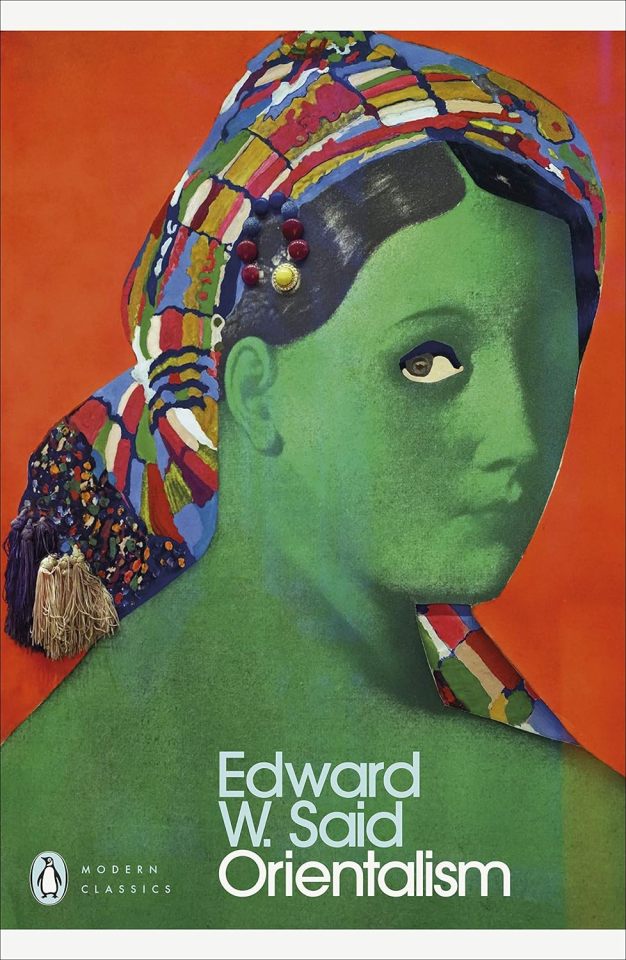
109 notes
·
View notes
Text
An intellectual is like a shipwrecked person who learns how to live in a certain sense with the land, not on it, not like Robinson Crusoe whose goal is to colonize his little island, but more like Marco Polo, whose sense of the marvelous never fails him, and who is always a traveler, a provisional guest, not a freeloader, conqueror, or raider.
— Edward W. Said, Representations of the Intellectual.
Follow Diary of a Philosopher for more quotes!
#Edward W. Said#Representations of the Intellectual#dark academia#academia#book quotes#quote#quotes#colonization#imperialism#studyblr#gradblr#Robinson Crusoe#Marco Polo#chaotic academia#literature#lit#lit quotes
45 notes
·
View notes
Text
Excerpts from Edward Said's The Essential Terrorist, a review of the 1986 book Terrorism: How the West Can Win by Benjamin Netanyahu
This brings us to the book at hand, Terrorism: How the West Can Win, edited and with commentary, weedlike in its proliferation, by Benjamin Netanyahu, the Israeli ambassador to the United Nations. A compilation of essays by forty or so of the usual suspects–George Shultz, Jeane Kirkpatrick, Lord Chalfont, Claire Sterling, Arthur Goldberg, Midge Decter, Paul Johnson, Edwin Meese 3d, Jean-Francois Revel, Jack Kemp, Paul Laxalt, Leszek Kolakowski, etc.–Terrorism is the record of a conference held two years ago at the Jonathan Institute in Washington, Jonathan Netanyahu being Benjamin’s brother, the only Israeli casualty of the famous raid on Entebbe in 1976. (It is worth noting that victims of “terrorism” like Netanyahu and Leon Klinghoffer get institutes and foundations named for them, to say nothing of enormous press attention, whereas Arabs, Moslems and other nonwhites who die “collaterally” just die, uncounted, unmourned, unacknowledged by “us.”)
[...]
In fact, Terrorism: How the West Can Win is a book about contemporary American policy on only one level. It is equally a book about contemporary Israel, as represented by its most unyielding and unattractive voices. An attentive reader will surely be alerted to the book’s agenda from the outset, when Netanyahu, an obsessive if there ever was one, asserts that modern terrorism emanates from “two movements that have assumed international prominence in the second half of the twentieth century, communist totalitarianism and Islamic (and Arab) radicalism.” Later this is interpreted to mean, essentially, the K.G.B. and the Palestine Liberation Organization, the former much less than the latter, which Netanyahu connects with all nonwhite, non-European anticolonial movements, whose barbarism is in stark contrast to the nobility and purity of the Judeo-Christian freedom fighters he supports.
Unlike the wimps who have merely condemned terrorism without defining it, Netanyahu bravely ventures a definition: “terrorism” he says, “is the deliberate and systematic murder, maiming, and menacing of the innocent to inspire fear for political purposes.” But this powerful philosophic formulation is as flawed as all the other definitions, not only because it is vague about exceptions and limits but because its application and interpretation in Netanyahu’s book depend a priori on a single axiom: “we’ are never terrorists; it’s the Moslems, Arabs and Communists who are.
[...]
Certainly Israeli violence against Palestinians has always been incomparably greater in scale and damage. But the tragically fixated attitude toward ‘armed struggle’ conducted from exile and the relative neglect of mass political action and organization inside Palestine exposed the Palestinian movement, by the early 1970s, to a far superior Israeli military and propaganda system, which magnified Palestinian violence out of proportion to the reality. By the end of the decade, Israel had co-opted US policy, cynically exploited Jewish fears of another Holocaust, and stirred up latent Judeo-Christian sentiments against Islam.
[...]
For the main thing is to isolate your enemy from time, from causality, from prior action, and thereby to portray him or her as ontologically and gratuitously interested in wreaking havoc for its own sake. Thus if you can show that Libyans, Moslems, Palestinians and Arabs, generally speaking, have no reality except that which tautologically confirms their terrorist essence as Libyans, Moslems, Palestinians and Arabs, you can go on to attack them and their ‘terrorist’ states generally, and avoid all questions about your own behavior or about your share in their present fate.”
#the essential terrorist#edward said#edward w. said#benjamin netanyahu#terrorism#terrorism how the west can win#israel#i read this on blaming the victims earlier this year and idk that this has been circulated on tumblr much. glad it's in The Nation website!#zionism#post
15 notes
·
View notes
Text
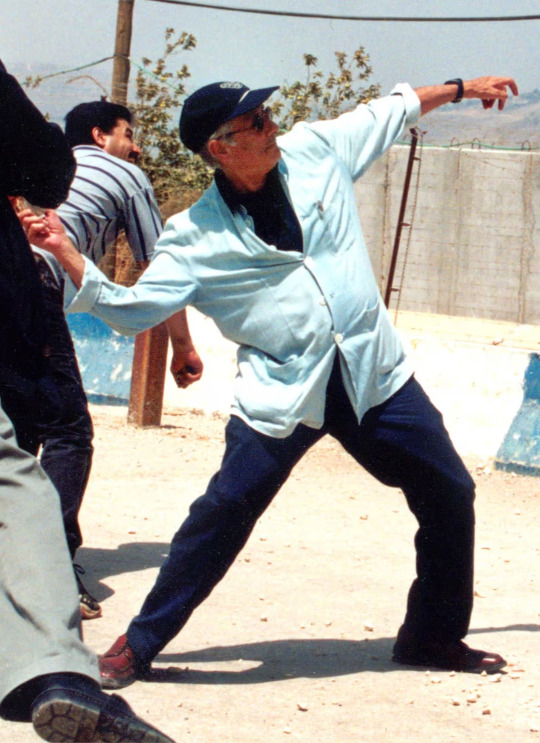
Palestinian-American professor, political activist, and author of Orientalism Edward W. Said throws a stone over the border between Israel and Lebanon, July 3rd 2000
#edward said#edward w. said#such a great picture i can't believe i haven't seen it b4#rest in peace king
12 notes
·
View notes
Text
There is nothing mysterious or natural about authority. It is formed, irradiated, disseminated; it is instrumental, it is persuasive; it has status, it establishes canons of taste and value; it is virtually indistinguishable from certain ideas it dignifies as true, and from traditions, perceptions, and judgments it forms, transmits, reproduces.
— Edward W. Said, from Orientalism (1978.)
4 notes
·
View notes
Text

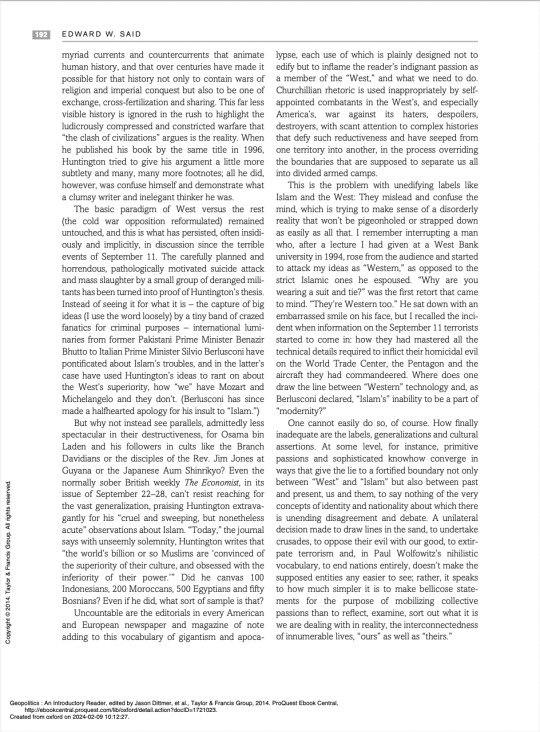

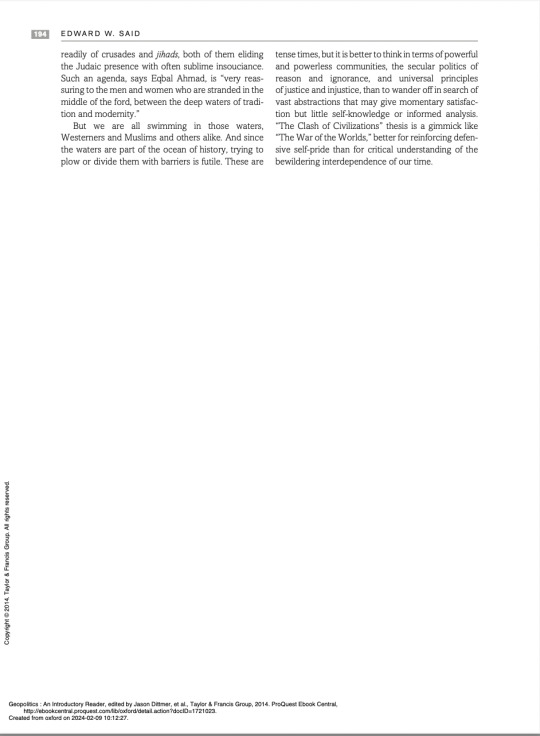
Said, Edward W. “The Clash of Ignorance.” In Geopolitics, 191–194. 1st ed. Routledge, 2014.
#interesting little chapter i was reading today#edward said#edward w. said#as always he never misses
4 notes
·
View notes
Text

“You cannot continue to victimize someone else just because you yourself were a victim once—there has to be a limit.”
Edward W. Said, 1935-2003
4 notes
·
View notes
Quote
Narrative itself is the representation of power, and its teleology is associated with the global role of the West. Fanon was the first major theorist of anti-imperialism to realize that orthodox nationalism followed along the same track hewn out by imperialism, which while it appeared to be conceding authority to the nationalist bourgeoisie was really extending its hegemony. To tell a simple national story therefore is to repeat, extend, and also to engender new forms of imperialism.
Edward W. Said, Culture and Imperialism
#rhetorical control#anti colonialism#decolonize#balkanization#edward w. said#edward said#edward w said#said#edward wadie said#1993#said 1993#culture and imperialism#nonfiction#neonationalism
105 notes
·
View notes
Text
i wanted to share this because i think it's important and i haven't seen anyone mention it:
i highly recommend reading Edward W. Said's book After the Last Sky: Palestinian Lives (available on internet archive for free, but i recommend buying it). Said is palestinian, and in the book he talks about his childhood in palestine and the effects of being exiled from his homeland.
it's extremely important to read palestinian perspectives of historical events, as depending on what you read, it can drastically affect your own perspective. media outlets siding with israel call the palestinians “terrorists” and frame them as the ones in the wrong. however, a palestinian person's POV is radically different. palestine does not have an official military force, so they are practically defenseless against israel's attacks. it could be argued (i would argue) that what israel is doing is virtually genocide, and palestine’s attacks on them are acts of self-defense and of protest against their oppressor.
the book is a true eye opener, and everything that Said says is still relevant today/can be applied to the israel-hamas war. it also includes photos, which truly emphasize the trauma and horrors the palestinian people have faced.
here's an amazon review of the book i think sums it up really well: "This book is a must-see/read for anybody interested in a genuine solution to the pressing problems in Palestine. Edward Said's poignant descriptions of both Palestinian woes and the fight to retain identity force one either to reeavaluate his or her notions of the Palestinians (if one is inclined to take Western propaganda for granted), or to further support the Palestinian right to live with increased fervor and empathy. If the text is not given a chance, then the photos pose an even greater challenge: Should we finally all accept responsibility for the faltering, ludicrous "peace process" in the Middle East?"
don't stop talking about palestine! don't stop supporting the palestinian people! people are still dying! FREE PALESTINE! 🇵🇸
#free west bank#free palestine#free gaza#gaza#palestine#israel#save palestine#stop israel#human rights#current events#west bank#jerusalem#edward w. said#After the Last Sky: Palestinian Lives
53 notes
·
View notes
Text

TYCO, (illustration), Pankaj Mishra: 'The Reorientations of Edward Said', «The New Yorker», April 19, 2021 [© TYCO/Tyler Comrie]
#art#illustration#photography#magazine#edward w. said#edward said#tyco#tyler comrie#the new yorker#2020s
217 notes
·
View notes
Text
Exile is strangely compelling to think about but terrible to experience. It is the unhealable rift forced between a human being and a native place, between the self and its true home: its essential sadness can never be surmounted. And while it is true that literature and history contain heroic, romantic, glorious, even triumphant episodes in an exile’s life, these are no more than efforts meant to overcome the crippling sorrow of estrangement. The achievements of exile are permanently undermined by the loss of something left behind forever.
Edward W. Said, from Reflections on Exile
#edward w. said#reflections on exile#palestinian literature#essays#writing back#exile#literary text#books and libraries#world literature#quotes#dark acadamia aesthetic#classic literature#hardship#sadness#edward said
34 notes
·
View notes
Text
instagram
2 notes
·
View notes
Text
The difficulty with theories of essentialism and exclusiveness, or with barriers and sides, is that they give rise to polarizations that absolve and forgive ignorance and demagogy more than they enable knowledge [...] If you know in advance that the African or Iranian or Chinese or Jewish or German experience is fundamentally integral, coherent, separate, and therefore comprehensible only to Africans, Iranians, Chinese, Jews, or Germans, you first of all posit as essential something which, I believe, is both historically created and the result of interpretation -namely the existence of Africanness, Jewishness, or Germanness, or for that matter Orientalism and Occidentalism. And second, you are likely as a consequence to defend the essence or experience itself rather than promote full knowledge of it and its entanglements and dependencies on other knowledges. As a result, you will demote the different experience of others to a lesser status.
— Edward W. Said, Culture and Imperialism.
Follow Diary of a Philosopher for more quotes!
#Edward Said#Edward W. Said#Culture and Imperialism#Book quote#book quotes#essentialism#studyblr#academia#dark academia#quote#quotes#gradblr#chaotic academia#light academia#study blog#studying
42 notes
·
View notes